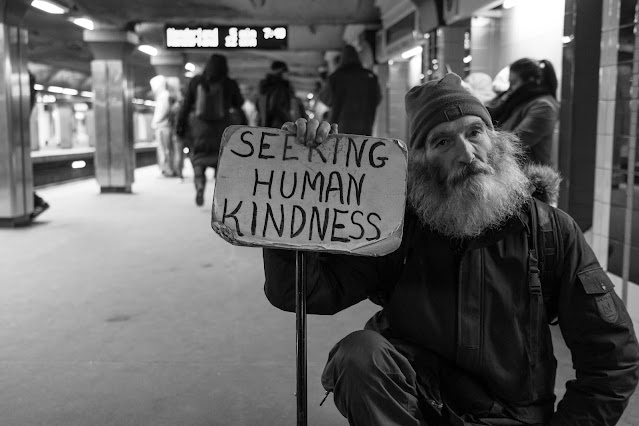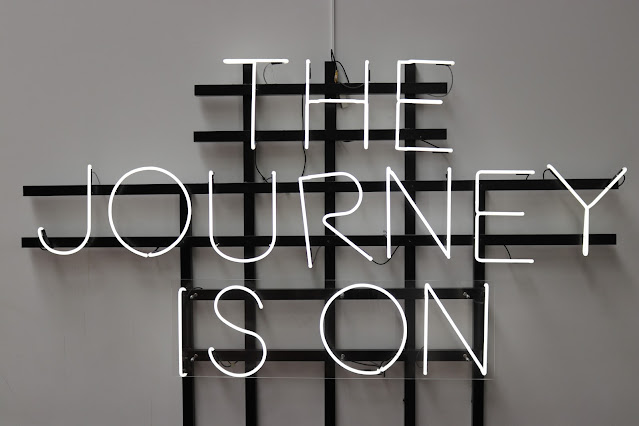Culpability in Mr. Jordan Neely's Death
It had been a hellish two months... I'm not quite ready to share, but I am very serene that it is now in the past. Returning home from one of my solo dinners with a book in ages to celebrate civility returning to my life, I was reminded of Mr. Jordan Neely's death as the Lyft car paused in traffic in front of 1313 W 8th Street. The building houses the ACLU. One of the NGOs I used to support. That past tense is a long story for another time.
Above the proud lettering of ACLU at the entrance lists things we desperately need such as housing, healthcare, green space... More police just above the ACLU are crossed off. Another reason I will no longer support the ACLU. Even in the days of hell, Mr. Neely's death and Mr. Daniel Penny had caught my attention, one man's death in another man's hands.
You may not have heard of Mr. Jordan Neely. He died before reaching thirty-one years of age, while on New York's Top 50 List of Homeless People at Risk with an open arrest warrant. To give you some perspective, New York City has over eight million people. The list overseen by a task force of city agency workers and social-service nonprofits lists those who stand out for the severity of their troubles and resistance to accepting help.
 |
| Photo by Matt Collamer on Unsplash |
In November 2021, Mr. Neely punched a 67-year-old woman and broke several bones in her face. He was arrested, served time in jail, and released to a residential treatment program in February. He walked out of the facility two weeks into the program and never returned. The open arrest warrant was for this.
You may not have heard of Mr. Daniel Penny, who placed Mr. Neely in a chokehold when he allegedly began ranting at passengers on New York City's F train on May 1. That chokehold killed Mr. Neely. After outcry and protests for justice, Mr. Penny was charged with second-degree manslaughter. There is no doubt that Mr. Penny's action to restrain a homeless man who at moments seems to be pleading for humanity with words of threat indicating that he wasn't afraid of jail and even death resulted in Mr. Neely's death.
I first learned of Mr. Neely's death from The Wall Street Journal Editorial Board's opinion: Charging Daniel Penny, the Subway Samaritan. The Editorial Board's concern that charging Mr. Penny, even if he is acquitted by a jury, will discourage potential Samaritans from intervening to stop a seemingly dangerous person is legitimate.
As a Metro Train (L.A.'s version of N.Y. subway) rider, this isn't a simple case of one man killing another man. I live in a county with approximately 70,000 homeless people. Harassments, threats, and violence are real as much as it is heartbreaking to see so many homeless people living in inhuman conditions without dignity.
Whether we like it or not, the presence of police helps keep civility and provides safety for riders. That is the reality. Just as homeless people have rights, I also have the right to walk and ride public transportation without threat of harm. Perhaps, Mr. Penny was attempting to protect himself and other passengers. Is it possible that Mr. Penny heard Mr. Neely's words as a threat, that he will do anything for food and water, risking jail and even his own death? Is it possible that Mr. Penny saw Mr. Neely even before he spoke and falsely perceived him as a threat because he was a homeless man? Everything is possible.
It is complicated. I doubt that Mr. Penny knew of Mr. Neely punching and breaking bones in November 2021. I don't think Mr. Penny knew that Mr. Neely was on New York's Top 50 List of Homeless People at Risk with an open arrest warrant. Without knowing Mr. Neely's history, why did Mr. Penny perceive him to be such a threat that he used deadly force which is banned in many police departments?
What if a Samaritan or two had handed Mr. Neely food and a bottle of water rather than a chokehold? What if everyone on that train had chipped in a dollar each for Mr. Neely as he pleaded for food and water? What if the city and its agencies had provided timely medical and housing aid as his mental wellness started to deteriorate many years ago? What if the police had been on the train so that Mr. Penny wouldn't have felt the need to restrain Mr. Neely? What if we had looked after folks in our community, volunteered, and donated resources? What if we had exercised humanity rather than avoidance?
Aren't we all in some ways culpable for Mr. Neely's death? We live in a society where a man pleading for food and water can be reasonably perceived as a threat because that has become a reality. I don't know if Mr. Penny perceived Mr. Neely as a threat because he was a Black homeless man. We live in a society that is plagued with racism. That doesn't mean Mr. Penny is a racist. If you've read "Was I Wrong To Have Accused White Men?", then you know sometimes things are not always what we first perceive them to be.
From my experience riding the Metro Trains for nearly a decade now, I can empathize with how Mr. Penny may have perceived Mr. Neely as a threat. I am not on Team Penny; however, this may not be about a White Man killing a Black Homeless Man. This may be where we as a society are culpable in Mr. Neely's death by neglecting a man who desperately needed help.
Mr. Penny killed Mr. Neely with a deadly chokehold, but haven't we been slowly killing Mr. Neely for years with avoidance and indifference?





Comments
Post a Comment